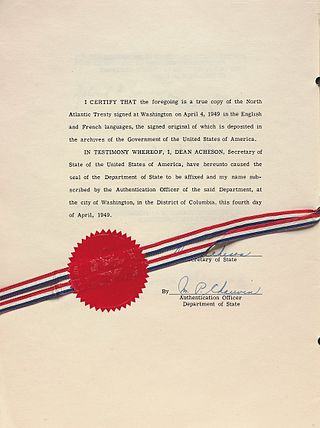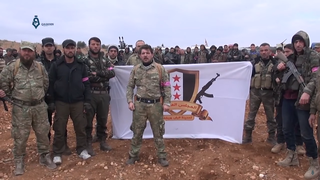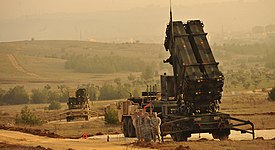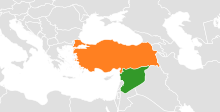
The North Atlantic Treaty Organization, also called the North Atlantic Alliance, is an intergovernmental military alliance of 32 member states – 30 European and two North American. Established in the aftermath of World War II, the organization implements the North Atlantic Treaty, signed in Washington, D.C., on 4 April 1949. NATO is a collective security system: its independent member states agree to defend each other against attacks by third parties. During the Cold War, NATO operated as a check on the threat posed by the Soviet Union. The alliance remained in place after the dissolution of the Soviet Union and the Warsaw Pact and has been involved in military operations in the Balkans, the Middle East, South Asia, and Africa. The organization's motto is animus in consulendo liber. The organization's strategic concepts include deterrence.

The North Atlantic Treaty is the treaty that forms the legal basis of, and is implemented by, the North Atlantic Treaty Organization (NATO). The treaty was signed in Washington, D.C., on 4 April 1949.
This is a broad timeline of the course of major events of the Syrian civil war. It only includes major territorial changes and attacks and does not include every event.
As the civil uprising phase of the Syrian Civil War turned into an all-out civil war, the 911-kilometre-long (600 mi) Syria–Turkey border became the scene of minor military clashes between the Turkish Army and various factions in the war to the south.

Turkey's involvement in the Syrian Civil War began diplomatically and later escalated militarily. Initially, Turkey condemned the Syrian government at the outbreak of civil unrest in Syria during the spring of 2011; the Turkish government's involvement gradually evolved into military assistance for the Free Syrian Army in July 2011, border clashes in 2012, and direct military interventions in 2016–17, in 2018, in 2019, 2020, and in 2022. The military operations have resulted in the Turkish occupation of northern Syria since August 2016.
The 2015 NATO emergency meeting was an emergency convention of the North Atlantic Treaty Organization called by Turkey, in accordance to Article 4 of NATO's founding treaty. It is the fifth such meeting called in the organisation's 66-year history. The meeting was held in Brussels, Belgium on 28 July 2015 and was attended by ambassadors of all NATO's member states.

On 30 September 2015, Russia launched a military intervention in Syria after a request by the government of Bashar al-Assad for military support in its fight against the Syrian opposition and Islamic State (IS) in the Syrian civil war. The intervention was kick-started by extensive air strikes across Syria, focused on attacking opposition strongholds of the Free Syrian Army along with the rebel coalition of the Revolutionary Command Council and Sunni militant groups under the Army of Conquest coalition. In line with Ba'athist Syrian propaganda which denounces all armed resistance to its rule as "terrorism"; Syrian military chief Ali Abdullah Ayoub depicted Russian airstrikes as facilitating their campaign against terrorism. Russian special operations forces, military advisors and private military contractors like the Wagner Group were also sent to Syria to support the Assad regime, which was on the verge of collapse. Prior to the intervention, Russian involvement had been heavily invested in providing Assad with diplomatic cover and propping up the Syrian Arab Armed Forces with billions of dollars of arms and equipment. In December 2017, the Russian government announced that its troops would be deployed to Syria permanently.

The Turkish military operation in Idlib Governorate, code-named Idlib De-escalation Control Force activities by Turkey, is an operation by the Turkish Armed Forces which started in October 2017, following the earlier Operation Euphrates Shield. It is the third cross-border operation by the Turkish military, following Operation Euphrates Shield and Operation Shah Euphrates.
The following is a timeline of the Syrian Civil War from May to August 2018. Information about aggregated casualty counts is found at Casualties of the Syrian Civil War.
The following is a timeline of the Syrian Civil War from September to December 2018. Information about aggregated casualty counts is found at Casualties of the Syrian Civil War.
The following is a timeline of the Syrian Civil War from May to August 2019. Information about aggregated casualty counts is found at Casualties of the Syrian Civil War.

The 2019 northwestern Syria offensive, codenamed "Dawn of Idlib", was a military operation launched on 30 April 2019 by the Syrian Armed Forces and its allies against rebel groups in northwestern Syria during the Syrian civil war in a region known as "Greater Idlib", consisting of northwest Hama, southern Idlib and northeastern Latakia provinces. The government's main objectives were to open the M5 highway and to expel non-compliant militant groups, particularly the internationally proscribed al-Qaeda-linked group known as Hayat Tahrir al-Sham (HTS), from the 15–20 km demilitarized zone demarcated by Turkey and the Russian Federation at Sochi in 2018. The offensive was seen by both parties as crucial to the outcome of the war.

The 2019–2020 northwestern Syria offensive, codenamed "Dawn of Idlib 2," was a military operation launched by the armed forces of the Syrian Arab Republic, Russia, Iran, Hezbollah and other allied militias against Syrian opposition and allied fighters of the Syrian National Army, Hayat Tahrir al-Sham, Rouse the Believers Operations Room, the Turkistan Islamic Party, and other rebel and Salafi jihadist forces in Idlib and surrounding governorates during the Syrian civil war. The offensive began on 19 December 2019 and saw Russian-backed pro-Syrian government forces clash with Turkish-backed opposition groups along with leaving 980,000 civilians displaced.
The following is a timeline of the Syrian Civil War from September–December 2019. Information about aggregated casualty counts is found at Casualties of the Syrian Civil War.
On 27 February 2020, during the Dawn of Idlib 2 Operation, a joint airstrike was executed by the Russian and Syrian Air Forces against a convoy of the Turkish Army stationed in Balyun, within the Idlib Governorate. Turkish President Recep Tayyip Erdoğan reported that the assault resulted in the loss of 36 Turkish soldiers. However, alternative sources suggested a significantly higher death toll, ranging from 50 to 100 casualties, marking it as the most lethal attack on Turkish forces since their engagement in the Syrian Civil War commenced. The assault also inflicted injuries on an estimated 36 to 60 soldiers, with 16 of them reported to be in a critical state. This incident represented the most substantial loss of life experienced by the Turkish Army on foreign territory since the Turkish invasion of Cyprus in 1974. In response to this attack, the Turkish Armed Forces initiated Operation Spring Shield in the province of Idlib.

Operation Spring Shield was a cross-border military operation carried out by the Turkish Armed Forces (TSK) in the Idlib Governorate of northwestern Syria against the Syrian Armed Forces and allied militias. The operation was launched on 27 February 2020 in direct response to the Balyun airstrikes, aiming to address the escalating situation in the region.
The following is a timeline of the Syrian civil war for 2020. Information about aggregated casualty counts is found at Casualties of the Syrian civil war.
The Qah missile strike, known by the Syrian opposition and some Arab media sources as the Qah massacre was a missile attack that took place on 20 November 2019. A surface-to-surface missile carrying cluster munitions launched by the Syrian Arab Army along with Iranian militias from defense laboratories south of Aleppo targeted a camp for the displaced in the village of Qah near the Syria-Turkey border. Fifteen civilians were killed, including six children.
The following is a timeline of the Syrian civil war for 2021. Information about aggregated casualty counts is found at Casualties of the Syrian civil war.










